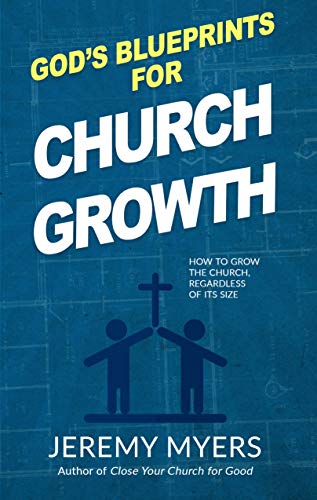 Note: This study is from my book, God’s Blueprints for Church Growth.
Note: This study is from my book, God’s Blueprints for Church Growth.
Once upon a time, in a local church, there were four people named Everybody, Somebody, Anybody, and Nobody. There was an important job to be done and Everybody was asked to do it. But Everybody was sure that Somebody would do it. Anybody could have done it, but Nobody did it.
Then Somebody got angry about it, because it was Everybody’s job. But since Everybody thought that Anybody could do it, and Nobody realized that Everybody wouldn’t do it, it ended up that Everybody blamed Somebody and Nobody did the job that Anybody could have done in the first place.
Right about this time, a fifth person visited the church. This person’s name was Confused. He looked around, saw what was happening, and never came back.
All too often, this describes life in the local church. It is unclear who is supposed to do what, and this leads to confusion, frustration, and hurt feelings. But church is not supposed to be this way. God never intended for church to be so confusing. God describes in Scripture who is to oversee the building of the church and who is supposed to do the work. God very carefully delineates in Scripture who is supposed to do what in His church. Since God is the architect of the church, He gets to determine how the church is formed, and how the church grows and functions.
One of the premier passages in Scripture which lays out God’s plan for church growth is Ephesians 4:11-16. This passage describes the leaders on the construction site, which we can think of as the Foremen (Ephesians 4:11), the people who do the work, or the Crew (Ephesians 4:12), the construction Model that we are imitating and turning into a reality (Ephesians 4:13), and the Program goal that the church will fulfill once it is constructed (Ephesians 4:14-16). When all of these pieces are in place, the church will grow as God wants and desires.

This study considers the first part element to the Construction site, the Foremen. Every construction site has Foremen. On any work site, the Foremen make sure that everybody knows what they need to know, does what they are supposed to do, and does it in unison so that that the task gets done right. They make sure that the foundation is laid correctly, the walls go up square, and that the wiring and plumbing goes in correctly. They also make sure that things get done in the right order—the sheet rock goes on after the plumbing and the electrical work—and that the right people do the right job—you don’t want the plumber doing the roofing. Without Foremen, the construction site would be chaos.
The same is true for the church. There are four specific spiritual gifts God has given to various Overseers so that they can better shepherd the church. Ephesians 4:11 provides us with the list of four gifts. Now, if you don’t have one of these four spiritual gifts, that’s okay. It just means you have some other spiritual gifts. We will talk about that in a different study, but if you wanted to find out more about your spiritual gifts right now, I have an online course about spiritual gifts and a book about discovering and using your spiritual gifts titled What Are the Spiritual Gifts?
But Ephesians 4:11 just mentions four spiritual gifts, the four that are key to helping bring the church to a place where it can grow into unity and maturity.
Ephesians 4:11. And He Himself gave some to be apostles, some prophets, some evangelists, and some pastors and teachers.
In English, it appears that there are five gifts mentioned here: apostles, prophets, evangelists, pastors, and teachers. But in Greek, many scholars agree that there are only four gifts listed. The last two, pastors and teachers, are very likely combined in the Greek to form one gift known as pastor-teacher.
Apostles
The first of the Foremen are the apostles. We know the apostles were the twelve disciples chosen by Jesus in John 6. Judas, who betrayed Christ, was later replaced by Matthias (Acts 1:15-26).[1] Yet the number of apostles in the early church was not limited to just these twelve. Paul was an apostle (Gal 1:15-17; 1 Cor 15:8) as was Barnabas (Acts 14:14). Two members of the church in Rome were also called apostles (Rom 16:7), one of whom appears to be a woman. So with these five additional apostles, there are at least seventeen apostles in the Bible. Yet when we discover what makes an apostle and what an apostle was supposed to do, we can assume that there were more than just these seventeen.
The Roman Catholic Church teaches what is known as apostolic succession. They believe that the apostles were able to pass on their position of authority and leadership to other people. This is usually done by the church after an apostle dies, as we see happen with Matthias replacing Judas in Acts 1. In accordance with this, they teach that the Pope is the successor of Peter.
The logical consequence of this is the Catholic doctrine of Papal Infallibility. Catholics teach that since apostles have the ability to speak and write the Word of God, and since the Pope is the successor of the apostle Peter, then anything the Pope says or writes is without error and is equal to the Bible. This has gotten the Catholic Church into some problems over the years, and it all stems back to the belief that there are still apostles today who speak and act with the authority of God.
Yet even many so-called “Protestant” churches and denominations have their fair share of problems even without apostolic succession. Just as apostolic succession has not kept the church free from error and problems, the absence of apostolic succession has not done any better. Some pastors and Ph.D.’s have created just as many problems for the church as have various Popes. There are even a number of “Protestant” churches that are led by self-proclaimed apostles who are thought to speak with just as much authority as the Catholic Pope.
The issue of apostolic authority can be cleared up by learning from Scripture what an apostle is and what an apostle does. When we understand the apostolic requirements and responsibilities, we are then able to see why they are important for the church and what role they serve in the church today.
What Makes an Apostle?
The term “apostle” is one of those English words that has not been properly translated from the Greek. (In fact, there are three of these words in Ephesians 4:11, “apostle,” “prophet,” and “evangelist.” Others such words include “Christ” and “baptism”). The Greek words is apostolos, and rather than translate this word from Greek into English, the word has simply been transliterated, so that the Greek letters are changed into English letters, and then the word is left as it is (minus the word endings). So when we seek to understand what an apostle is and does, we must begin by understanding what the word “apostle” means.
The best translation for apostolos is “sent one.” It refers to some sort of official or ambassador who is sent out by a group or individual to another place with a message to declare or task to perform. When translating this term, words like “messenger” or “delegate” would be good English equivalents. The apostles, therefore, were a special class of believers who were chosen by God to carry out a specific task and deliver a specific message to the world. There could, of course, be different types of apostles who were sent to perform different tasks. Jesus even referred to Himself as one sent (John 17:18; 20:21) from God, and so it could be said that He was an apostle of God.
For example, one type of apostle is the apostle of Jesus Christ, which is someone who was specifically called by Jesus and sent by Jesus to perform a specific task for Jesus. The New Testament records three conditions for being an apostle of Jesus Christ.
First of all, the Bible tells us that an apostle of Christ must have had personal contact with Jesus Christ (Acts 1:8, 21-23). This, of course, immediately eliminates everyone born after 33 A.D. Although we do not know if Paul had any physical contact with Jesus (some speculate that he was the Rich Young Ruler in Matthew 19 and Luke 18), he did have personal contact with the risen Christ on the road to Damascus (Acts 9:3-9, 15-16). This is why Paul refers to himself as one abnormally born (1 Cor 15:8).
Yet there were thousands who had personal contact with Jesus during His thirty-three years on earth, but not all of them are apostles. This is due to the second qualification. An apostle must also have personally seen the resurrected Jesus Christ (Acts 1:21-22; Luke 24:48; 1 Cor 9:1-2). This narrows the number of people down to just a couple hundred (1 Cor 15:5-8).
The third qualification narrows it down to a select few. The final element in becoming an apostle of Jesus is that a person must also have received a direct appointment to the office of apostle by Jesus Christ Himself (Luke 6:13-16; 1 Cor. 15:8-9).[2] Jesus Christ handpicked His apostles (cf. John 6:70).
These three requirements reveal that the official office of “apostle of Jesus Christ” cannot exist today, because nobody alive today can fulfill all three requirements. This does not mean that there cannot be apostles today; there can be. To understand how there can be apostles today while not the official office of “apostle of Jesus Christ,” we must understand what apostles do.
What Apostles Do
Since the word “apostle” means “sent one” the church can send out apostles, or God can send out apostles. We see various instances of these types of apostles elsewhere in the New Testament. Usually, they are called by God, or by a church, and are sent out to an unreached people group with the message of the gospel. I think that the other apostles in Scripture would fall into this category, such as Barnabas and the two apostles in Rome. Yes, these are “sent ones,” but they were sent out by the church, not specifically by Jesus Christ. Hence, they would not carry the official title of “apostle of Jesus Christ.”
These other “sent ones” are typically sent out by the church to carry the gospel to unreached people groups. Therefore, it might be best to think of them as missionaries. Missionaries are sent by the church to carry the gospel to new geographical areas and deliver it to new groups of people. So are there apostles today? In this missionary sense, yes. Just as there were some “apostles” in the days of Paul who were not “apostles of Jesus Christ,” there can be apostles today who can be considered as “sent ones” and yet do not have the same authority as the “apostles of Jesus.”
But Paul is not referring to the “missionary” apostle in Ephesians 4:11. Though Paul only refers to them as “apostles” here, he has in mind in mind the authoritative and foundation-laying “apostles of Jesus Christ.” In context, he refers to the “holy apostles” (Eph 3:5), as a way of speaking about the apostles who were called and sent by Jesus Christ to lay the foundation for the church by teaching and writing about Jesus Christ and the gospel (Eph 2:20). We also know that this is what Paul means because he refers to the “prophets” next, which will be discussed below.
So these apostles in Ephesians 4:11 where the apostles of Jesus Christ. Jesus called them and chose them to carry the news about His life and ministry into the rest of the world. But something happened as they went out performing this task. After Jesus died, rose, and ascended, they travelled around, teaching others about Jesus and the Kingdom of God which He inaugurated. Yet they expected that Jesus Christ would return during their lifetime. They hoped that the second coming of Jesus Christ would occur within a few years, or a couple decades at most. But it didn’t. The years went by, and Jesus did not return. As the apostles aged, they realized that the task of spreading the gospel to the entire world would require more than their lifetimes, and that it was increasingly unlikely that Jesus would return before they died.
So the apostles of Jesus Christ set out to record with pen and paper the message they had been given so that it could continue to go into all the world even after the apostles had left this world. These writings of the apostles are what we now call the New Testament. The apostles of Jesus received, declared, and recorded God’s written word (John 14:26; Acts 11:28; 21:10-11; Eph 3:5).
Therefore, when Paul writes about the apostles in Ephesians 4:11, he is referring not only to the apostles of Jesus, but also to their authoritative, apostolic writings, which has now been complied by the church into the New Testament. Further evidence that this what Paul means is seen by the next term he uses, the prophets.
Prophets

The prophets are the second of the Foremen. Like “apostles,” the term “prophets” is another transliteration from Greek. The Greek word is prophetēs, and refers to someone who declares a message from God. The word is similar to “apostle” but places more emphasis on the spoken message. Prophets were not often “sent” to another people or region (though occasionally they were, as with Jonah). They usually stayed in their home region and declared God’s message to their own people.
There were two main types of messages that a prophet might declare. There are two facets of prophecy. To most people, a prophet is someone who predicts the future, and foretells what will happen. But this is only a relatively small part of what a prophetic message. The vast majority of biblical prophecy is concerned with calling God’s people back to a proper obedience to God. This is not foretelling future events, but forthtelling God’s righteous requirements. While prophecy can refer to telling the future, it mostly refers to telling the truth. It is not primarily about predicting events, but rather about proclaiming God’s Word.
Are there prophets today? Well, just as with the apostles, the short answer is “Yes,” but not in the way that many assume. There are people today who have the spiritual gifts of apostleship or prophesy. But these gifts are used today when missionaries are sent to unreached people groups, or when certain people call the church to repent and return to a proper way of living with God. So while we do have these types of apostles and prophets (we should call them missionaries and preachers), we do not have the types of apostles and prophets that Paul refers to in Ephesians 4:11. The ones he writes about in this verse were those who wrote Scripture. The canon is closed. Scripture is written. So although there can be prophets today, this is not what Paul had in mind when he wrote about prophets here.
Just as with his term apostles, Paul has a very specific type of prophet in mind. Paul did not have in mind the various prophets who might have been alive in his day, but was instead referring to the prophets who wrote the Hebrew Scriptures, which we call the Old Testament. Jewish people typically referred to the Hebrew Bible as “the law and the prophets.” Jesus Himself spoke about the Hebrew Scriptures this way (cf. Matt 5:17; 7:12; 11:13; etc.). The “law” referred to the first five books of the Bible, which is sometimes called the Torah, or the Pentateuch, and the “prophets” referred to everything else.
Modern scholars tend to divide up the “prophets” into three divisions of historical books, poetic books, and prophetic books. Jewish scholars separate the prophets into two categories, the prophets and the writings, so that the entire Hebrew Bible was called the Tanakh (TNK, shorthand for Torah, Nevi’im, and Ketuvim). But since all the historical writings were written by Jewish prophets, it was not uncommon to speak about the writings and the prophets as “the prophets.” In fact, since the law itself was written by Moses, the greatest Jewish prophet (Deut 34:10; Acts 7:37), it too can be considered a “prophetic,” and therefore, included within the overarching term of “the prophets.”
So when Paul writes here about prophets, he is thinking about the people who wrote the Hebrew Scriptures. Just as “apostles” refers to the writings of the apostles of Jesus Christ, “prophets” refers to the writings of the Hebrew prophets, which make up the Old Testament (cf. 2 Pet 3:2). And all of this refers to the testimony about Jesus Christ (John 5:39; Rev 19:10)
Therefore, by referring to the apostles and prophets, Paul reveals his conviction about the centrality of Scripture for the church. No work that the church does can be successful in the eyes of God if not built on the foundation as laid by the apostles and prophets. And as we recall, the foundation is Jesus Christ Himself, but we read and learn about Him within Scripture. This is why the church should place a large emphasis on the Word of God. By doing so, the church is building on the foundation of Jesus Christ as we learn about Him from the pages of Scripture as recorded by the apostles and prophets. This is the good and solid foundation upon which we can build.
 Many years ago, I worked at summer Bible camp as a counselor and director. The camp is located on a lake, and about 50 years ago, when they built the kitchen and dining hall, they thought it would be nice to situate the building on the lakeshore so that people could look at God’s glorious creation while cooking or eating. And it was glorious. I have many fond memories of eating my meals while listening to the waves lap at the foundation of that building.
Many years ago, I worked at summer Bible camp as a counselor and director. The camp is located on a lake, and about 50 years ago, when they built the kitchen and dining hall, they thought it would be nice to situate the building on the lakeshore so that people could look at God’s glorious creation while cooking or eating. And it was glorious. I have many fond memories of eating my meals while listening to the waves lap at the foundation of that building.
But over the years, the shore of the lake slowly eroded away from beneath the foundation. As a result, the foundation started crumble. But the eroding lakeshore was not all to blame. Part of this problem was due to a poor foundation. They did not dig the foundation hole deep enough, and when they poured the concrete, they failed to use any supporting rebar. As a result, very large cracks eventually developed in the foundation until eventually the building was condemned as being too unsafe to use and the camp had to tear down that beautiful dining hall on the shore.
The apostles and prophets laid a good foundation for the church. The prophets laid the foundation as we find it in the writings of the Old Testament. The apostles continued to lay the foundation through writing about Jesus Christ, and these writings have now been collected into the New Testament. And if the church is going to grow and thrive, we must make sure that we are building upon this good and solid foundation.
So we have a good foundation in the writings of the apostles and prophets. But a building is not done with just a foundation. A foundation is important and necessary, but it is not a building. It is just a concrete slab. A building also needs walls and a roof, windows and floors. It needs plumbing and lighting. So how do all these things get added to the church? How does God’s church get put together? God’s church is not made of wood, concrete, glass, paint, carpet, and shingles, but of people who are called by God to follow Jesus into the world. So how is it that the church as God’s people is built and formed upon the foundation of Jesus Christ as recorded in Scripture?
Well, the first thing needed is to get people into the church and show them how to live. This is done through the work and ministry of evangelists, who are the third group of God’s Foremen.
Evangelists
Just as with apostles and prophets, the word “evangelist” is not a translation from the Greek, but a transliteration. The Greek word is euangelistēs, and is closely related to the word for gospel, euangelion. To emphasize this close connection, I have suggested elsewhere that the term “gospelist” might be a better translation than “evangelist,”[3] but since this word us unlikely to receive wide acceptance, maybe the word could be translated as “one who teaches the gospel.” However, since the gospel is about way more than just words and ideas, and also contains instructions on how to live life as a member of God’s family, it might be best to include some sort of element of “proper living” in the translation of euangelistēs, such as “one who lives the gospel.” Living the gospel would, of course, include both words and actions.
An evangelist, then, is someone who both understands the call of the gospel as found in Scripture and lives it out in their own life as a way to invite other people to believe in Jesus and live out the gospel as well. It would not be wrong to think of an evangelist as a disciplemaker. They live as a follower of Jesus themselves, and through their words and actions, invite others to also become followers of Jesus. Since the gospel is about all of life, then the evangelist who lives the gospel will be showing others how the gospel affects their entire life as well.
 Notice that when we understand an evangelist in this way, the work of evangelist is not accomplish by preaching in a street corner, knocking on doors, or handing out gospel tracts. The work of an evangelist is not primarily accomplished through inviting people to believe in Jesus for eternal life. While this is certainly part of the work of an evangelist, for the offer of eternal life is part of the gospel, it is not the entire work of an evangelist. Through their words and actions, an evangelist helps bring unbelievers to believe in Jesus for eternal life, and then brings believers to follow Jesus in their life.
Notice that when we understand an evangelist in this way, the work of evangelist is not accomplish by preaching in a street corner, knocking on doors, or handing out gospel tracts. The work of an evangelist is not primarily accomplished through inviting people to believe in Jesus for eternal life. While this is certainly part of the work of an evangelist, for the offer of eternal life is part of the gospel, it is not the entire work of an evangelist. Through their words and actions, an evangelist helps bring unbelievers to believe in Jesus for eternal life, and then brings believers to follow Jesus in their life.
This is what Paul means in 2 Timothy 4:5, when he invites Timothy to “do the work of an evangelist.” Paul is instructing Timothy to do the work of living out the gospel in his life. And since Timothy is a leader in the church, this means that Timothy is providing an example to the people in his church about how to live out the gospel in their own lives as well.
So how does the work of living out the gospel fit with the foundation that has been laid by the apostles and prophets? The answer is that just as the apostles and prophets laid the foundation, the evangelist prepares to build upon that foundation by bringing people into the church and then showing them how to live as members of God’s family. The evangelist is the supplier. The evangelist brings the boards and siding and shingles of the spiritual church building so that they are ready and available to be put together into a structure.
And who are the evangelists? The truth is that every Christian is to be an evangelist. Since all Christians are to be living out the gospel in their life, this means that all Christians are evangelists, for “evangelism” means “living the gospel.” But thankfully, as we have already seen, this does not necessarily mean that you have to pass out gospel tracts, go door-to-door, or preach on street corners. Evangelism happens when you live out the gospel in this world in front of your family, friends, neighbors, and coworkers. While words might often be used, the gospel can also be lived out in front of others by loving them and serving them in tangible ways, or simply by being a good neighbor, an honest employee, or a cheerful friend. As we live the gospel in various ways, people see our good deed and glorify our Father who is in heaven, and are invited into the Kingdom of God along with us.
So the apostles and prophets laid the foundation of Jesus by writing Scripture. The evangelists prepare to build on this foundation by bringing the building resources to the construction site. Evangelists follow Jesus and invite others to do the same. But of course, we are still missing one element before construction can begin. The foundation has been laid, the construction materials have all been delivered. But right now, all the materials are all just lying around as piles of lumber and boxes of nails. There is no order, structure, vision, or direction for how all the pieces come together. This is why God provided the fourth foreman, the pastor-teacher.
Pastor-Teachers
As was previously indicated, these two terms in Ephesians 4:11 are best understood as complimentary to one another. They are not two separate titles. Linguistically, the Greek indicates that they must at least be complimentary if not synonymous. Greek scholar and teacher Daniel Wallace, in a detailed and thorough analysis of this Greek construct, says that although the Greek does not demand these two terms be synonymous, neither does it imply their separation. Ultimately, he comes to the following conclusion:
In light of the fact that elders and pastors had similar functions in the NT, since elders were to be teachers, the pastors were also to be teachers. Conversely, not all teachers were said to be pastors. This evidence seems to suggest that the [pastors] were a part of the [teachers] in Eph 4:11 … all pastors are to be teachers, though not all teachers are to be pastors.”[4]
 In other words, while there are various types of teachers in the church, some of them will be of a special type, which Paul calls the pastor-teacher. While not all teachers are pastors, all pastors will be teachers, and therefore, it is best to think of them as pastor-teachers.
In other words, while there are various types of teachers in the church, some of them will be of a special type, which Paul calls the pastor-teacher. While not all teachers are pastors, all pastors will be teachers, and therefore, it is best to think of them as pastor-teachers.
So what do the two words mean? We know what a teacher is. A teacher is someone who imparts information to others. But what about the word “pastor”? The word “pastor” is not just a title. It comes from the world of shepherding, and is related to taking sheep to pasture. In fact, the Greek word for pastor is poimenos, which can also be translated “shepherd.” A pastor is to the shepherd of the flock of God’s people under his care. As Philip Keller so poignantly reveals in his book, one of the primary tasks of a shepherd is providing proper nourishment and protection for his sheep.
He will go to no end of trouble and labor to supply them with the finest grazing, the richest pasturage, ample winter feed, and clean water. He will spare Himself no pains to provide shelter from storms, protection from ruthless enemies and the diseases and parasites to which sheep are so susceptible.[5]
A pastor, then, shepherds the flock. When used in reference to shepherding people, a pastor leads people to green pastures where they can be fed, shows them where the calm and clean waters are from which they can drink, and protects them from dangerous predators and thieves who only want to kill, steal, and destroy. Jesus is the great Shepherd, and His under-shepherds are pastor-teachers.
The fact that Paul equates the work of the pastor with teaching indicates that teaching is a primary function of shepherding. All the functions of a spiritual shepherd can be accomplished through good teaching. Through teaching, the pastor guides his flock to green pastures where they can eat healthy spiritual food. Through teaching, the pastor takes his flock to clean and calm water from which they can safely drink. And through teaching, the pastor warns and protects his flock against false ideas, damaging and destructive philosophies, and wolves in sheep’s clothing who want to kill and destroy the flock.
What is it then that the pastor should teach? Well, by inference, since the apostles and prophets laid the foundation for the church through writing Scripture, the pastor-teacher should focus on teaching Scripture. And who is it that the pastor should teach? Here again, since the evangelist gathered together the construction materials which will form the church, and these materials are the people of God, then the pastor-teacher focuses time and attention on teaching Scripture to God’s people (cf. Acts 6:4; 1 Tim 5:17; 2 Tim 4:2). Almost every time the New Testament talks about the roles and responsibilities of the spiritual leaders of the church, teaching Scripture is at the top of the list (cf. Acts 20:28; 1 Tim 3:2; 4:6-16; 2 Tim 4:1-4; Titus 1:3; 2:1; 1 Pet 5:2). For the spiritual shepherd, this feeding and protecting is best accomplished through teaching the Word of God. It is impossible to be a good shepherd without feeding the flock of God with the Word of God.[6]
The apostles and prophets poured the foundation. Through both words and actions, the evangelist gathers together the building materials. The pastor-teacher then explains Scripture in a way to guide and instruct these building materials on how they are to be put together in a logical and useful way for God’s church. He guides and protects the people so that together, they begin to form the church. We could almost say that if it is the evangelist’s job to bring people into the church, it is the pastor-teacher’s job to raise them up in the church. The evangelist brings a person to faith; the pastor-teacher trains a person about the faith. The evangelist increases the quantity of people in the church; the pastor-teacher increases the quality.[7]
Just as with the other three Foremen, the pastor-teacher’s job is vitally important. If the pastor-teacher fails to instruct the people of God about the Word of God, those Christians will never grow into maturity. They will forever be baby Christians. They will always remain disorderly and confusing heap of building materials. If a pastor does not faithfully and systematically teach Scripture to Christians, they will always be bottle-fed Christians who want only milk rather than meat, and who base their decisions on feelings and emotions rather than on the truth of the Word of God. Every pastor-teacher should want the people in his church to become mature Christians, and the only way to do that is to prepare and serve all-you-can-eat-steak-and-potato meals from Scripture.
I believe that nearly all of the blame for the sickly condition of Christianity today can be laid at the feet of those who call themselves pastors, but who have failed to serve as pastor-teachers. Bruce Wilkinson, in his book The 7 Laws of the Learner, states that if the students of a teacher or the congregation of a pastor are failing to learn, it is because the teacher or pastor is failing to teach.[8] This is where the modern church has failed the most. The church is weak because it has failed to understand that the primary role of a pastor is to teach, and to teach effectively.[9]
Part of the problem is that most pastors separate the two terms Paul lists in Ephesians 4:11. When separated, we get the idea that there are some leaders in the church called “pastors” and there are others who do the teaching. In the first case, when we have pastors who are not teachers, but are just care providers, we end up with Christians who feel cared for, but who don’t know much, and so cannot properly live or function as a follower of Jesus. They might be happy, but they are not very healthy. They remain immature babes for most of their life.
At the same time, the other extreme is just as dangerous. Some think that they are teachers who do not need to pastor. While it is possible to have teachers who are not pastors, they should not be given roles of leadership with in the church, but should instead seek positions in colleges or seminaries where they can focus on teaching. Then a pastor says “I am called to teach; not to pastor,” their teaching ends up lacking love and care for their flock, which is essential for their health and well-being. Such loveless teaching often degenerates into bashing sheep over the head with the bat of legalism every week, which leads only to fear, shame, and guilt, rather than into Christlike maturity.

Pastor-teachers must remember that their two roles are actually one. A true pastor-teacher is one who knows the primary way of feeding and caring for his flock is through faithful and systematic teaching of Scripture, while at the same time, the teaching of Scripture is not an end in itself which is solely an academic pursuit, but is for the purpose of loving and caring for other people. Pastor-teachers will spend a lot of time with their nose in the books, but they will also spend time with the people of the community.
There is no room in God’s church for the unapproachable, ivory tower personality who stands on a pedestal to deliver a message from God and then retreats back to his chambers in order to avoid mingling with the masses. While it is a wonderful idea to have times set aside for the uninterrupted study of Scripture, every pastor-teacher should also have times where people can drop in for a visit, or where the pastor goes out to visit the people where they are at.
Richard Baxter, a great preacher himself, wrote a book called The Reformed Pastor. In it, he said this:
That work which is our great end must be done, whatever be left undone. It is a very desirable thing for a physician to be thoroughly studied in his art; and to be able to see the reason of his practice, and to resolve such difficult controversies as are before him. But if he had the charge of a hospital, or lived in a city where the pestilence was raging, if he would be studying fermentation, the circulation of the blood, blisters, and the like, and such like excellent points, when he should be visiting his patients, and saving men’s lives; if he should even turn them away, and let them perish, and tell them that he has not time to give them advice, because he must follow his own studies, I would consider that man as a most preposterous student, who preferred the remote means before the end itself of his studies: indeed, I would think him but a civil kind of murderer.[10]
Although Baxter first published this in 1656, the truths are the same now as they were then.
George Herbert lived about the same time. When he became a pastor, he set down for himself some rules to live by. His book, called The Country Parson, is filled with sound, practical advice for every pastor. He says at one point that “the Country Parson upon the afternoons in the weekdays takes occasion sometimes to visit in person, now one quarter of his Parish, now another. For there he shall find his flock most naturally as they are, wallowing in the midst of their affairs …”[11]
More recently, in a popular journal on leadership-related issues, Warren Wiersbe gave advice on how to preach practical sermons. “The experiences we preachers go through are not accidents; they are appointments. They do not interrupt our studies; they are an essential part of our studies … It is difficult to preach to people you do not know.”[12]
All of this is simply to reinforce that a pastor-teacher is primarily a teacher of Scripture, but this teaching must be warmed by personal encounters with the people under his care. Through a firm grasp of Scripture, the pastor-teacher will be able to see which building materials have been gathered together by the evangelist, and will then be able to teach, guide, and direct the people of the church to come together and build the church that God wants and desires. This will be the topic of the next study on Ephesians 4:12.

Conclusion
Ephesians 4:11 lists the four Foremen: apostles, prophets, evangelists, and pastor-teachers. Before any church can grow, it needs to have a firm grasp on the identity and tasks of these Foremen, and be committed to following them where they lead. The apostles and prophets wrote Scripture. The evangelists lives out the gospel in front of others as a way of gathering people together as the church. The pastor-teachers gets to know these people so that they can be taught Scripture and trained in how to function and grow as the Body of Christ in the world. With these Foremen in place, the church is ready to understand who does the actual work of the ministry.
Notes:
[1] There is some question as to whether or not this replacement was warranted. After this, the book of Acts never mentions Matthias again. Some think that maybe Paul was actually God’s choice. Or possibly there was not supposed to be a replacement at all. Maybe Judas served his role as an apostle, and so there was no need to replace him, in which case, the Bible does not endorse “apostolic succession.”
[2] Robert L. Thomas, Understanding Spiritual Gifts (Grand Rapids: Kregel, 1991), 175-176.
[3] See my books The Gospel According to Scripture (Dallas, OR: Redeeming Press, 2018) and The Gospel Dictionary (Dallas, OR: Redeeming Press, 2018). There are online courses related to both books, which can be found at RedeemingGod.com/courses/
[4] Daniel B. Wallace, “The Semantic Range of the Article-Noun-Kai-Noun Plural Construction in the New Testament,” Grace Theological Journal 4:1 (Spring 1983), 83.
[5] Philip Keller, A Shepherd Looks at Psalm 23; The Classic Works of Philip Keller (Grand Rapids: Family Christian, 1970), 24.
[6] Gene Getz, Sharpening the Focus of the Church (Wheaton: Victor, 1988), 121-150.
[7] Chester McCalley, Commentary and Outline of Ephesians (Kansas City: Word of Truth, no date), 43.
[8] Bruce Wilkinson, The 7 Laws of the Learner (Sisters, OR: Multnomah, 1984), 30-31, 131.
[9] Michael Fabarez, Preaching that Changes Lives (Nashville: Thomas Nelson, 2002), 5, 19.
[10] Richard Baxter, The Reformed Pastor (Carlisle, PA: Banner of Truth Trust, 1999), 312.
[11] George Herbert, The Country Parson (New York: Paulist, 1981), 75.
[12] Warren Wiersbe, “The Patented Preacher,” Leadership (Winter 1994), 70.
Join Our Telegram Group : Salvation & Prosperity










